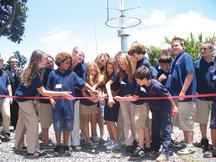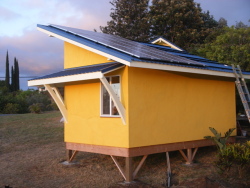Kula designer wants to put alternative power in your hands
by Rob ParsonsSeptember 3 , 2009
 photo: Rob Parsons |
 |
 |
I
met Erik Beale, after trading e-mails for weeks, at an Upcountry soiree
for renewable energy enthusiasts. Cars lined Baldwin Avenue just below
the memorial cemetery and Makawao town. The midday sun beat down as
visitors strolled up the driveway to see an array of electric cars, and
tents shading display materials and handouts.
Erik has been
working on prototypes for pre-fabricated structures designed to
accommodate solar photovoltaic panels. He recently launched
MauiEcoBuilt (mauiecobuilt.com), offering modular buildings that can
serve as a workshop, art studio, home office, storage shed, exercise
room or garage. Like many in attendance at the "Cutting the Red Tape on
Renewable Energy" event, he has taken matters into his own hands,
designing a renewable energy solution that can be immediately
implemented.
Blue-shirted Carden Academy students piled into the
Mama's Fish House electric runabout vehicle, reminiscent of college
kids cramming into VW Beetles years ago. After a polite reprimand from
their teacher, they assembled to do a ceremonial cutting of red ribbon.
 |
 |
 |
Behind them, a 30-foot tall Windspire turbine on a vertical axis spun forcefully in strong winds pushed in front of Tropical Storm Felicia. The recently installed, whisper quiet wind energy system was a primary reason for choosing the Banyan Tree House venue, one of many old plantation luna homes lining the curving roadway bearing the name of a century-ago sugar planter.
The
outdoor gathering, organized by architect/entrepreneur Michael Angelo
Leone of HIEV (Hawaii Electric Vehicles) also attracted those looking
to invest in smart, green design. Matt Daniells, co-owner of Kaupakalua
Road landmark Hanzawa Store in Haiku, said he's looking for ways to
retrofit—and to offset the $6,000 monthly electric bill needed to run
refrigeration equipment, gas pumps and lights.
Daniells, like
Beale a champion board sailor, looked up at the spinning Windspire and
said, "It's supposed to blow like this again tomorrow. Let's go
sailing!"
You could say that Beale has been accustomed to
harnessing natural energy for a long time. Born in France, he was a
competitive skateboarder, ranked 6th in Europe at age 13. But at age 15
he began windsurfing, and started racing six years later.
In
1986 at the Canary Islands, Beale set a windsurfing world record of 35
knots. Two years later, on the canals of Saintes-Maries-de-la-Mer in
South France, he shattered that record, gaining the outright sailing
mark at 40.48 knots.
 |
 |
 |
Beale studied at the London School of
Industrial Design, which provided his best opportunity to combine
interests in architecture, furniture and racecar design and ergonomics.
He acquired skills that allowed him to help design the windsurfing
speed craft that earned him the title of world's fastest sailor.
After
more than 20 years of custom home design, Beale is now turning his
focus to modular kits and panel wall systems that are extremely
efficient and can be constructed in as little as 2-3 days. His latest
innovation is optimizing roof pitch and area to allow for solar PV
panels on freestanding buildings, with a variety of applications and
variations.
A week after the renewable energy gathering, I met
him at his property on upper Omaopio Road, on the sunny lower slopes of
Haleakala. A bright yellow one-room building glowed in the late
afternoon sunshine. Twelve solar panels were mounted on one half of the
roof, facing Maalaea Bay to the south. Beale grinned broadly as we
walked over to the electric meter on his home next door. "We tested it
today for the first time, and it was amazing to see the meter spinning
backwards," he said.
He has already incorporated energy
efficiency into his residence—with Energy Star rated appliances and
lots of natural lighting—and requires a mere five kilowatt hours per
day ($55 monthly). His new solar PV system generated 4.2 kwh in its
first four hours of operation. Beale explained that net-metering
customers may accrue more credits during summer months, when the sun's
higher position in the sky produces more electricity (output is
averaged for the entire year).
 |
 |
 |
Surprisingly, his 12' by 16'
yellow building was built—legally—without a building permit. With 192
square feet of floor space, it's just under the 200 sq. ft. limit that
triggers a permit requirement. The building can't be used for living
space, can't have plumbing and the electricity generated by its solar
panels may not be used by the building itself. Instead, it's
transmitted to the main dwelling.
Beale believes this design has
great potential for an as-yet untapped market: an electric car
"chargeport." He even envisions businesses doing parking lot
installations, catering to customers moving away from vehicles that
operate on fossil fuel.
Solar panel prices are down right now,
but that could change as demand increases, bolstered by favorable
incentives. Those investing in solar PV can benefit from federal and
state tax credits of 50 and 30 percent, respectively. Further, they are
eligible to amortize half of the depreciation in the first year.
As
a builder, Beale understands that not all existing roofs are adapted
for solar panel installations, especially those that are older, tiled
or have unfavorable pitch angles. His designs, with metal roofing made
here in Hawaii, work well with the extruded aluminum rack mounts for
the panels. As we sat in his kitchen, overlooking the Central Valley
and West Maui Mountains, he showed me a just-sketched design with
overhanging roof mounts that could accommodate up to 70 panels.
 |
 |
 |
He
went through a series of questions with County representatives before
constructing his prototype yellow building, and now has the model and
concept ready to sell. With his interest in being on the cutting edge
of new modular designs, he says eventually it makes sense to train
sub-contractors to install his kits. He cites the three main benefits
of his buildings as quality of materials (and minimum waste), speed of
assembly and reasonable cost.
Beale will be one of the
exhibitors at the upcoming Maui County Energy Expo 2009, to be held
September 10-11 at the Grand Wailea Resort & Spa. In addition to
panel discussions and presentations, the expo will offer
recommendations on renewable energy implementation by members of five
working groups of the Maui County Energy Alliance.
Beale's
enthusiasm seems to generate a happily contagious energy of its own.
It's easily reflected in the Kennedy-esque quote on one of his Web
pages: "Ask not what this planet can do for you, rather, ask what you
can do for this planet."